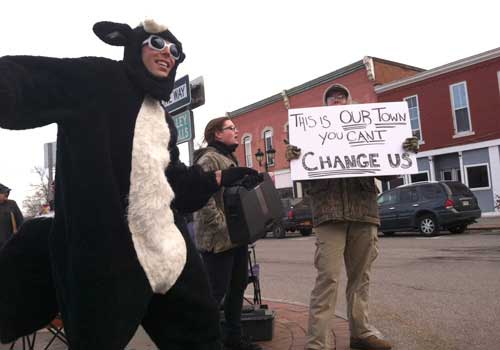Judge dismisses ‘Squirrel Slam’ lawsuit
State Supreme Court justice says hunt meets DEC regulations
ALBION – A State Supreme Court justice dismissed a case today against the Holley Fire Department, which sought to make the fire department complete an environmental impact assessment and study before organizing another Squirrel Slam.
The judge, Tracey Bannister of Erie County, heard oral arguments from both sides this morning.
She ruled the plaintiff, by Lauren Sheive of Williamson in Wayne County, didn’t have standing in the case because she lives 50 miles from Holley and was very unlikely to see a notable decrease in the squirrel population near her home.
Bannister also said the Squirrel Slam, typically held on a Saturday in late February, falls under state Department of Environmental Conservation regulations.
The case has the potential for larger implications if the judge determined an environmental impact needed to be done for hunting contests.
“This is an assault on hunting,” said Steven Shahan, an attorney from Syracuse representing the Holley Fire Department.
Hunting is a $5 billion industry in the state that brings families together and also culls wildlife in the absence of many of their natural predators, Shahan told the judge.
Bannister served as judge in the case after James Punch, acting Supreme Court justice in Orleans County, recused himself.
A team of four attorneys from Winston & Strawn LLP in New York City made the trip to Albion this morning to argue the case. That firm took on the case pro bono.
Anup Misra argued the case on behalf of Lauren Sheive.
“This is not an attack on hunting,” Misra said about the lawsuit. “We’re not trying to stop the hunting tradition.”
Misra said the Squirrel Slam resulted in a “massive” killing of a single species of a squirrel in one day.
He said the Fire Department should do an assessment of the loss of squirrels locally due to the contest.
“It’s no different than the hundreds of fishing derbies that take place each year in New York,” Shahan said.
Bannister said opening day of deer season also results in numerous deaths of deer.
“There is a massive slaughter of deer on opening day,” she said. “We can barely keep the courts open because there are so many deputies out hunting.”
The judge said the Holley hunt doesn’t violate any DEC regulations Participants are can’t exceed the DEC daily limit of five squirrels per hunter. The contest has room for 600 entries. Shahan said the contests average about one squirrel per entry, which he said doesn’t result in a massive killing of the species.
Misra argued that Sheive should have standing in the case even though she lives 50 miles from Holley. Some of the participants hunt 40 miles or more from Holley – less than an hour’s drive. Squirrels are also very mobile and Misra said it wasn’t inconceivable to think squirrels on Scheive’s property would be effected by the Squirrel Slam.
Scheive purposely lives in a wooded area in a backyard that is a certified wildlife area, Misra told the judge.
“She is a squirrel lover,” Misra said.
Her appreciation for the animals above and beyond how the average population feels about squirrels should give her standing in the case, Misra argued.
Shahan said that was a deficient reason to give Sheive standing in the case.
“She hasn’t proven injury or standing,” Shahan said. “You can’t just say you have an overabundance of interest in squirrels.”
Misra tried to raise another issue about SEQR, the State Environmental Quality Review Act. It requires government agencies to do an environmental when there is a significant environmental impact on “fauna or vegetation.” Misra said the loss of hundreds – perhaps more – of squirrels in a small geographic area should meet that threshold.
Shahan argued the Fire Department doesn’t fall under SEQR because it’s not a government entity, but a non-profit corporation.
The judge didn’t issue an opinion on that issue. She said ultimately the entire case may be a moot point because the Fire Department hasn’t scheduled another Squirrel Slam.
She did, however, want to rule on other aspects of the case because the department could plan another squirrel hunting contest. She didn’t see a legal reason for stopping the event.
Misra said the firm would likely appeal the decision.





























































